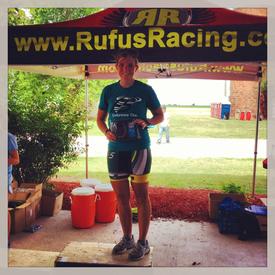RUNNING:: MyStrategies for building speeeeeeed!

AZTrailRunner
Posts: 1,199 Member
Hey all,
I recently talked to a few people who have been stuck at the same running speed for quite awhile, and have also routinely seen this same dilemma posed here on the forums. So I thought I would offer up my suggestions as to what has helped me get faster over the years. While I am not nearly the fastest guy out there, I've been fortunate enough to place in my age group in many races over the years. My personal best times are:
5K - 18:01 (5:48 pace)
10K - 39:59 (6:26 pace)
8 mile - 53:20 (6:40 pace)
1/2 Marathon - 1:33:17 (7:07 pace)
(all set at different times of my life)
I list my times not to brag, as they are not elite times, but many people have claimed them to be "fast", so take that as you will.
Also, the information I'm going to post is what has worked FOR ME, and is not meant to be THE MAIN track to speed. It is merely one suggestion from one guy who found success using it.
First off, I subscribe to a philosophy of "Run less, Run faster". So you will see I don't log a ton of miles, and don't run everyday. Again, this has worked for me! When training for triathlons, I learned I had to compromise one discipline for another throughout the week. Simply put, I just didn't have the time or energy to run more than 4 days per week, at most. The trade-off being that I have never had a running injury after nearly 30 years of running/ racing.
So what is MY strategy? Let's take a look.
First off, before I get into it, I like to have a base of running of 4-6 months before getting into this strategy. This is to insure I have built up enough muscle, joint, and connective tissue strength to avoid injury. So you may not want to get into this if you just started running a month ago.
My training weeks look something like this:
Day 1-- LSD (Long slow distance)- This is your long run, at a conversational pace. When planning to run a 5K or 10K, I want my LSD to be at least twice the distance of my future race. When getting into Half and Full Marathons, the LSD won't be double the race distance. The point of this run is to build a bigger gas tank.
Day 2 -- Active Rest (but no running)
Day 3 -- Hilly run or Hill intervals (maybe 50-75% of the LSD distance) I have one pace for the hills- whatever speed I can run without puking. The point of this run is develop calf, hamstring, and glute power... more so than you would develop on the flats. Building power in your legs and glutes is necessary for the push-off for each stride. I view this workout as developing more torque for my engine.
Day 4 -- Tempo Run - I start this run with a 10-20 minute easy run warm-up, then open the jets. I try to run fairly close to my predicted race pace for several miles. The tempo distance depends on your race length. Personally, I run this pace for about 75% of my race length, and then slow down for the last 10-15 minutes of my run. This run takes guts and really pushes your lactate threshold higher.
Day 5 -- Active Rest (but no running)
Day 6 -- Speed day (Intervals/ Fartleks) - This would be my shortest workout of the week. This can be done at a local high school track, or even on your neighborhood streets. The strategy here is to run fast (not at 100% though) for a short amount of time or distance, recover for a similar time or distance, then repeat again and again. The length of the interval depends on the race length - 5Ks = 200-400yds,,,10K = 400-600yards,,,1/2 marathon = 800yds - 1mile. The number of repeats would start low, around 4-6 per session, and gradually add 1 or 2 each week. I typically do a 1 mile WU and 1 mile CD for 5k and 10k distance workouts. The point of this workout is two-fold: Help raise your lactate threshold (and your V02 max), and also train your legs to turn over faster than you are used to. I envision this workout as giving my engine horsepower.
Day 7 -- Active Rest (but no running)
=======================================
You'll notice that I don't have any "easy runs" or "recovery runs" listed. I'm on the side of the fence that views a slow, pointless run as "junk miles". That is my opinion, and would not suggest other runners not do them. I used to have "Easy" days many many years ago, but since dropping them from my workouts found no consequences. Of course you may feel differently. Do whatever you feel comfortable with.
I am always open to sharing ideas to not only help myself improve, but also help others improve. So I would request that other serious racers use this thread to share your strategies with other new runners to help them improve. Let's make this a positive exchange of ideas. Run safe everyone!
JR
I recently talked to a few people who have been stuck at the same running speed for quite awhile, and have also routinely seen this same dilemma posed here on the forums. So I thought I would offer up my suggestions as to what has helped me get faster over the years. While I am not nearly the fastest guy out there, I've been fortunate enough to place in my age group in many races over the years. My personal best times are:
5K - 18:01 (5:48 pace)
10K - 39:59 (6:26 pace)
8 mile - 53:20 (6:40 pace)
1/2 Marathon - 1:33:17 (7:07 pace)
(all set at different times of my life)
I list my times not to brag, as they are not elite times, but many people have claimed them to be "fast", so take that as you will.
Also, the information I'm going to post is what has worked FOR ME, and is not meant to be THE MAIN track to speed. It is merely one suggestion from one guy who found success using it.
First off, I subscribe to a philosophy of "Run less, Run faster". So you will see I don't log a ton of miles, and don't run everyday. Again, this has worked for me! When training for triathlons, I learned I had to compromise one discipline for another throughout the week. Simply put, I just didn't have the time or energy to run more than 4 days per week, at most. The trade-off being that I have never had a running injury after nearly 30 years of running/ racing.
So what is MY strategy? Let's take a look.
First off, before I get into it, I like to have a base of running of 4-6 months before getting into this strategy. This is to insure I have built up enough muscle, joint, and connective tissue strength to avoid injury. So you may not want to get into this if you just started running a month ago.
My training weeks look something like this:
Day 1-- LSD (Long slow distance)- This is your long run, at a conversational pace. When planning to run a 5K or 10K, I want my LSD to be at least twice the distance of my future race. When getting into Half and Full Marathons, the LSD won't be double the race distance. The point of this run is to build a bigger gas tank.
Day 2 -- Active Rest (but no running)
Day 3 -- Hilly run or Hill intervals (maybe 50-75% of the LSD distance) I have one pace for the hills- whatever speed I can run without puking. The point of this run is develop calf, hamstring, and glute power... more so than you would develop on the flats. Building power in your legs and glutes is necessary for the push-off for each stride. I view this workout as developing more torque for my engine.
Day 4 -- Tempo Run - I start this run with a 10-20 minute easy run warm-up, then open the jets. I try to run fairly close to my predicted race pace for several miles. The tempo distance depends on your race length. Personally, I run this pace for about 75% of my race length, and then slow down for the last 10-15 minutes of my run. This run takes guts and really pushes your lactate threshold higher.
Day 5 -- Active Rest (but no running)
Day 6 -- Speed day (Intervals/ Fartleks) - This would be my shortest workout of the week. This can be done at a local high school track, or even on your neighborhood streets. The strategy here is to run fast (not at 100% though) for a short amount of time or distance, recover for a similar time or distance, then repeat again and again. The length of the interval depends on the race length - 5Ks = 200-400yds,,,10K = 400-600yards,,,1/2 marathon = 800yds - 1mile. The number of repeats would start low, around 4-6 per session, and gradually add 1 or 2 each week. I typically do a 1 mile WU and 1 mile CD for 5k and 10k distance workouts. The point of this workout is two-fold: Help raise your lactate threshold (and your V02 max), and also train your legs to turn over faster than you are used to. I envision this workout as giving my engine horsepower.
Day 7 -- Active Rest (but no running)
=======================================
You'll notice that I don't have any "easy runs" or "recovery runs" listed. I'm on the side of the fence that views a slow, pointless run as "junk miles". That is my opinion, and would not suggest other runners not do them. I used to have "Easy" days many many years ago, but since dropping them from my workouts found no consequences. Of course you may feel differently. Do whatever you feel comfortable with.
I am always open to sharing ideas to not only help myself improve, but also help others improve. So I would request that other serious racers use this thread to share your strategies with other new runners to help them improve. Let's make this a positive exchange of ideas. Run safe everyone!
JR
0
Replies
-
thats really interesting, thanks0
-
Very nice.
I end up with a run less, run faster approach by default. I just dont have the time to get any more than 3-4 runs in per week, so rarely do i have a maintenence run unless I just ain't feeling it that day. But I will say what really helped me was building a large (for me) volume of miles per week during marathon training. My pace just kept falling & falling and continues still.0 -
Thanks, this is great info.
I'm a new runner (started with C25K in January this year) and am currently training for a 12k in August.
I am really slow which doesn't bother me too much, I think getting miles into my legs is a good start but I would like to work towards a faster pace as well, so it's helpful to read what has worked for someone else.0 -
Thank u for the succinct info.
It is pretty much what I do, and I found that intervals did help me gain speed tremendously, but now I'm stuck at an 8mm for 5k.
Any advice how to break that barrier?
Btw, your times are insanely fast! Amazing!0 -
Interesting.
I personally don't view my miles as "junk", even though some are not speedwork, although, my mileage is often aimed at running marathons and ultras. For me, I believe that you should probably build up to the pounding that the marathon inevitably sends your way. I do get in 2 speedwork sessions and a long run a week.
Honestly though, it just looks like you took out 2 days I would run comfortably, and just put in active rest days. To me, it looks like it would act the same way... I just prefer to run and it serves a functional purpose for me.0 -
Thanks for posting this!0
-
I am planning for my first half marathon and will definitely try incorporating your tips. Thanks!!0
-
Thanks! That's great info.
However, I am training for a sprint triathlon and have 3 days per week to run. I also run 5K's when I can. Pretty soon, I will be doing my "brick" workouts where I will be running for 4 days, but one of them will be after getting off the bike. Which, if any, of those running workouts would you suggest for the brick workout? And on my non-brick weeks when I can only run 3 times, should I rotate through the 4 types of runs? Is there one that I should do every single week? I've really been struggling with how to improve my 5K while also training for my tri. Thanks!
(I bike 2 times per week, strength train 1 day a week, and swim once a week on the same day as a bike ride, and rest 1 day)0 -
Thanks for the tips!0
-
*bump* thanks again!!0
-
bump0
-
bump0
-
Solid training advice- thanks!0
-
Do you have any advice for getting a hill workout in when you live in a pretty flat area? or a substitution for hills?0
-
Do you have any advice for getting a hill workout in when you live in a pretty flat area? or a substitution for hills?
Run in sand or you could run up stairs (football stadium or tall building).0 -
bump0
-
Bump!0
-
useful sharing of info, thanks very much
 0
0 -
Great info thanks0
-
Thanks for this!0
-
I would like to add that inexperienced runners, if you're going to do this, please do so cautiously. On another board I frequent they have many pro triathletes and runners that suggest that in order to run fast, you should just run more. "Run more, mostly easy sometimes hard." Speed will come over time naturally, but more importantly for beginner runners is to build a strong base.0
-
I would like to add that inexperienced runners, if you're going to do this, please do so cautiously. On another board I frequent they have many pro triathletes and runners that suggest that in order to run fast, you should just run more. "Run more, mostly easy sometimes hard." Speed will come over time naturally, but more importantly for beginner runners is to build a strong base.
Agreed. It is definitely a point worth repeating. Thanks.0 -
Great post. I am a firm believer in 'run less, run smarter'. I haven't made the speed gains that you have, but I have allergy issues that slow me down, but I have had much less injury / soreness since following the F.I.R.S.T. running program ( run three days a week). You do have to establish your base before you get into the intensity, but I totally agree the extra intensity of the speed work and hills makes you faster and stronger than just running a lot of 'junk miles'.0
-
Bump0
-
Lots to ponder over, thanks people!0
-
Bump0
-
Thanks for this, I'll be back to read more later0
-
bump0
-
Thanks for the tips!
 ) 0
) 0 -
bump0
This discussion has been closed.
Categories
- All Categories
- 1.4M Health, Wellness and Goals
- 396.9K Introduce Yourself
- 44.2K Getting Started
- 260.9K Health and Weight Loss
- 176.3K Food and Nutrition
- 47.6K Recipes
- 232.8K Fitness and Exercise
- 454 Sleep, Mindfulness and Overall Wellness
- 6.5K Goal: Maintaining Weight
- 8.7K Goal: Gaining Weight and Body Building
- 153.3K Motivation and Support
- 8.3K Challenges
- 1.3K Debate Club
- 96.5K Chit-Chat
- 2.6K Fun and Games
- 4.5K MyFitnessPal Information
- 16 News and Announcements
- 18 MyFitnessPal Academy
- 1.4K Feature Suggestions and Ideas
- 3.1K MyFitnessPal Tech Support Questions




















